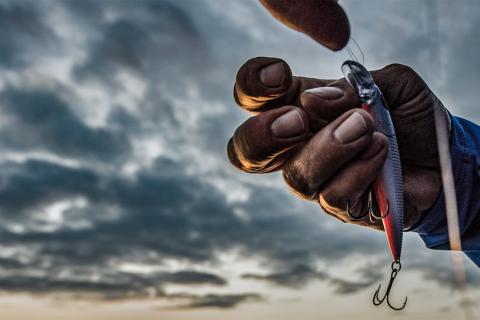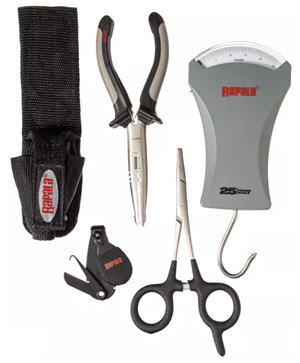
Classic fishing lures that have stood the test of time.
Rapala Fishing Lures History
Lauri Rapala was born in Finland over a century ago, in 1905. When he was in his 20's, he moved to the town of Riihilanti to try to make a living as a fisherman. While waiting for the nets to fill with perch and whitefish, he would row his wooden boat, trying to catch a trout with lures to add to the catch.

made its way to the U.S., it's still one
of the most popular lures in the world.
A sharp observer of nature, Lauri noted that feeding trout would always key in on a minnow with a wounded or wobbling action, instead of the healthy ones. Deciding to make a lure to duplicate this action, he carved a piece of wood to the shape of a baitfish, glued tin foil from a candy wrapper on and etched in a scale pattern.
Tentatively, he cast his creation into the clear waters of Lake Paijanne and began trolling. The trout responded with reckless abandon. The lure caught more fish than Lauri Rapala ever imagined was possible. And it caught not just trout, but also salmon and pike as well. Word spread quickly about the fish-catching bait and soon Lauri had his sons helping him hand craft the lures.

In the mid-1950s, a few of the lures found their way into the hands of fishermen in the United States. When he found out about the amazing thin-minnow plugs, Ron Webber came to an agreement with Rapala for distributing them through the Normark Corporation.

An August 1962 article in Life magazine (which had Marilyn Monroe gracing the cover) sent demand spiraling. Sixty years later, Rapalas are still one of the most popular lures in the world. They now come in a wide variety of shapes and sizes, from vibrators to fat-bodied crankbaits to surface lures. But the Rapala original thin-minnow version is still one of the best sellers and most productive fishing lures for a wide variety of species and angling situations.
Fishing Tactics for the Rapala Floating Minnow

Extremely versatile, the Rapala lures work well trolled on flatlines, using downriggers, and cast and retrieved for virtually all gamefish species. Twitching the lure in place drives bass crazy. On the other hand, a slow steady retrieve that anyone can master is one of the best presentations of all. Violent jerking followed by long pauses will goad strikes from northern pike and muskies. V-waking the lure slowly on top so it creases the surface but doesn't dive under it is deadly on striped bass in both freshwater and the brine.

Silver and black is the top color and imitates a wide variety of baitfish like shad well. Also try gold/black, gold/orange, silver/chartreuse or other colors that match the forage in your local fishing waters. Sizes to use can range from lures smaller than you thumb for trout to 7-inch versions for pike, muskies and big largemouths.
- 6445 views

